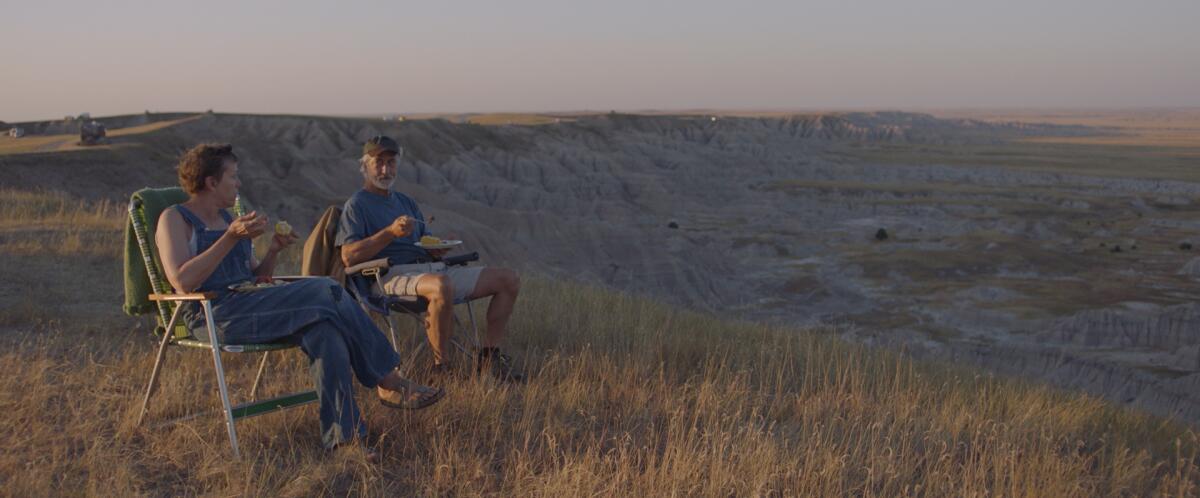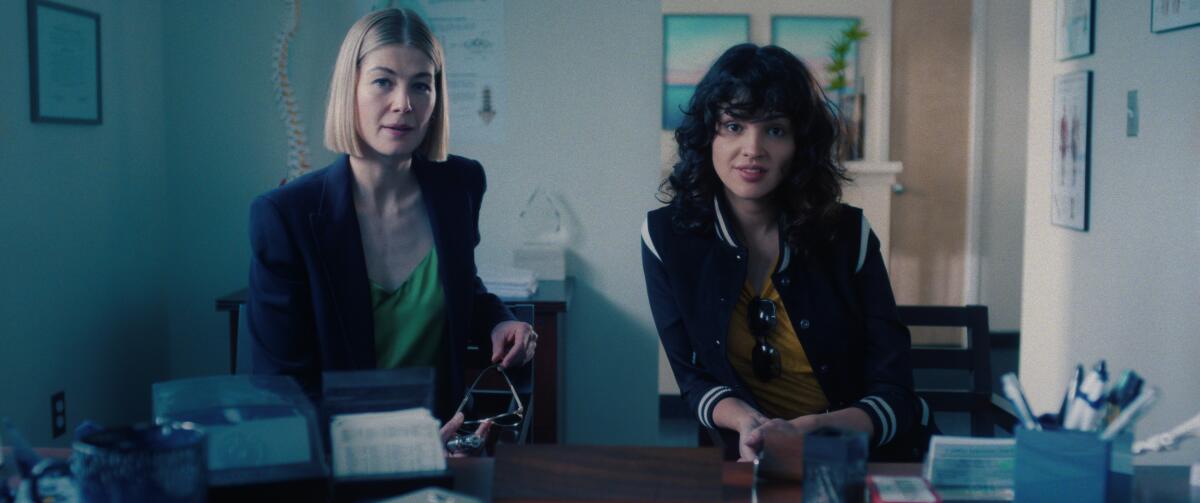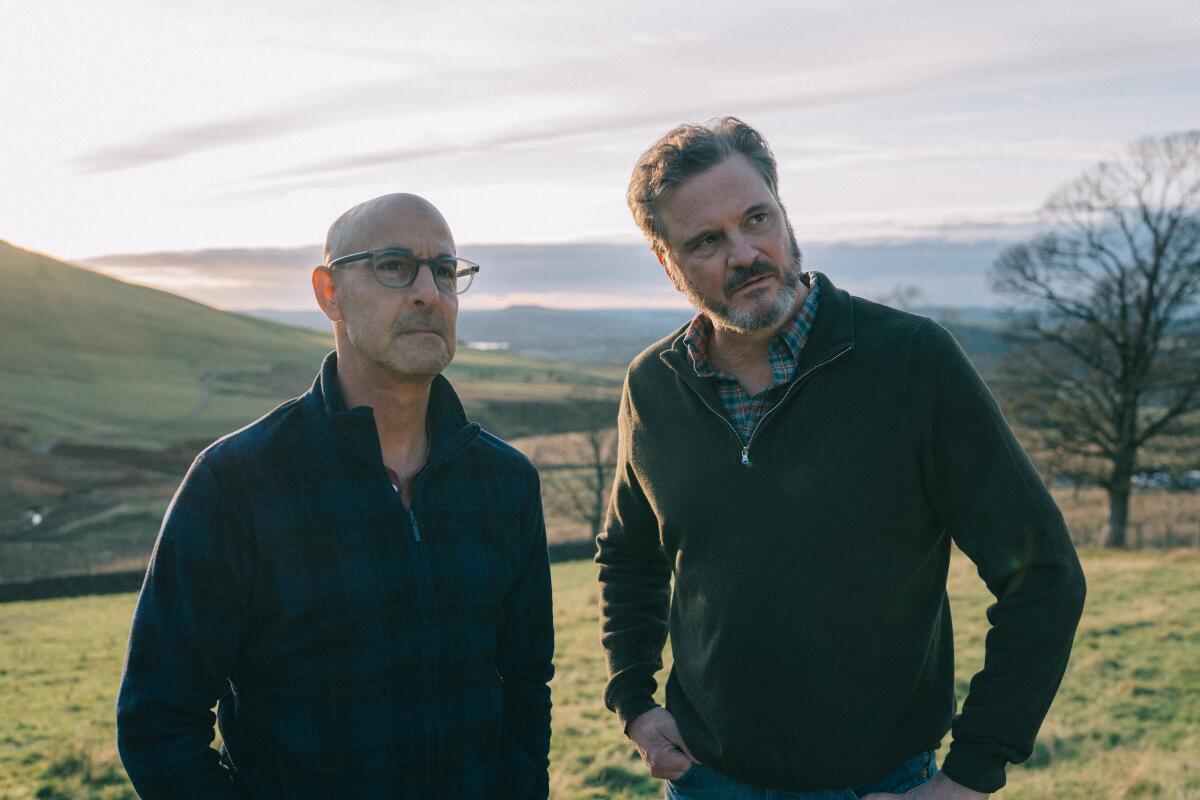Indie Focus: On the road with Frances McDormand in ‘Nomadland’
Hello! I’m Mark Olsen. Welcome to another edition of your regular field guide to a world of Only Good Movies.
Only good movies
Get the Indie Focus newsletter, Mark Olsen's weekly guide to the world of cinema.
You may occasionally receive promotional content from the Los Angeles Times.
This week on “The Envelope” podcast I spoke with filmmaker Lee Isaac Chung about “Minari.” The film won the grand jury and audience awards when it premiered at Sundance last year and has more recently picked up Golden Globe and SAG Award nominations.
We spotlighted the movie here a few weeks back, but it is great to hear more about it directly from the filmmaker himself. Drawn in no small measure from his own childhood experiences, the film tells the story of a Korean American couple (played by Steven Yeun, Yeri Han) who move with their two young children (Noel Cho, Alan Kim) to rural Arkansas. Soon, the wife’s mother (Yuh-Jung Youn) joins them.
“I wrote all these memories, and I could see the stories taking shape,” Chung said. “And what I felt was that those elements, the visual elements, could serve as, like, the details in this story and that I could introduce, like, these grander narratives of, you know, pursuing the American dream and pursuing farming and trying to be someone in the frontier, assimilation, all these different ideas to let them carry through all these little details, in a way. So that was the writing process. Took me about a year to write the script. That’s a very intensely private and torturous work, I’ve got to say.”
Enjoying this newsletter? Consider subscribing to the Los Angeles Times
Your support helps us deliver the news that matters most. Become a subscriber.
‘Nomadland’
Written and directed by Chloé Zhao and based on the nonfiction book “Nomadland: Surviving America in the Twenty-First Century” by Jessica Bruder, “Nomadland” is already among the most celebrated movies of the season. Frances McDormand stars as Fern, who hits the road in a converted van after being widowed and seeing her life collapse, and who discovers a community of self-styled nomads trying to make a go of it on their own. Already in limited theatrical release, the film is now streaming on Hulu.
David Strathairn, who plays a fellow nomad and possible romantic interest for Fern, spoke with Randee Dawn about the film’s small, mobile production crew. “It proves you can do some brilliant, beautiful work with a minimum of technical crew,” he said. “It was impressive to see this little roving band of filmmakers accomplish this.”
In his review for The Times, Justin Chang wrote, “‘Nomadland’ the movie, which won the top prizes at the recent Venice and Toronto film festivals, is less an adaptation of Bruder’s work than a free-form conversation with it. In addition to writing and directing, Zhao served as her own editor, and she has shaped the story as a series of discrete, offhand moments, keeping both Fern and the movie in continual motion. Fluid, inventive and even playful in ways that belie its generally somber tone, ‘Nomadland’ exists at that blurry juncture where fiction and nonfiction meet — a well-traveled zone that is nonetheless still rife with artistic possibilities.”
For the New York Times, A.O. Scott wrote, “Friendship and solitude are the poles between which Zhao’s film oscillates. It has a loose, episodic structure, and a mood of understated toughness that matches the ethos it explores. … [Zhao] captures the busyness and the tedium of Fern’s days — long hours behind the wheel or at a job; disruptions caused by weather, interpersonal conflict or vehicle trouble — without rushing or dragging. ‘Nomadland’ is patient, compassionate and open, motivated by an impulse to wander and observe rather than to judge or explain.”
For Rolling Stone, K. Austin Collins wrote, “Zhao, however, achieves something thornier than heroism. At times, watching Fern make her way amid fellow nomads, the film seemingly sets us up to take heart at her integration into this world: She feels of a piece with it. Other times — such as, notably, when she’s being left behind, and long columns of mobile homes and customized vans pass her by as her friends move on to find more work — what emerges is a sense of isolation. … For all the majesty and naturalistic realism of its imagery, ‘Nomadland’ is nevertheless full of sublime, uncanny details that lift it somewhat above the fray.”
For the Washington Post, Ann Hornaday wrote, “‘Nomadland’ is the kind of big and big-hearted movie — featuring a central performance at once epic and fine-tuned — that reminds you of how much life one film can hold, when circumstances allow. Those circumstances, in this case, are the essential elements of story, actor and interpreter: Here, all three fuse into a transcendent whole, inviting viewers into an experience that is simultaneously expansive and closely observed; spacious and impossibly hemmed-in; melancholy and gloriously liberated.”

‘I Care a Lot’
Written and directed by J Blakeson, “I Care a Lot” is a darkly comic thriller that upends expectations at every turn. Marla Grayson (Rosamund Pike) runs a profitable business forcing legal guardianship of elderly people and taking over their finances. Then she tangles with a wealthy woman (Dianne Wiest) with seemingly no family, which puts Marla afoul of a local crime lord (Peter Dinklage). The film is streaming now on Netflix.
I spoke to Pike, Blakeson, Wiest and Chris Messina about the movie and its many twists and turns. Pike also discussed what drew her to the part after her recent roles as photojournalist Marie Colvin in “A Private War” and scientist Marie Curie in “Radioactive.”
“I liked the sort of deliciously irresponsible nature of it,” Pike said. “I liked the fact that I’ve been playing these very morally worthy women, and I liked ... the chance to be reprehensible. And I thought it was a challenge. Can I be totally morally reprehensible and still be fun to watch? That was the territory I wanted to work in.”
Reviewing the film for The Times, Justin Chang wrote, “You’ve likely read a thing or two recently about crooked conservatorships in the celebrity sphere, though whether those headlines make ‘I Care a Lot’ seem like an unusually topical entertainment or expose it as a thin, opportunistic hustle is open to debate. The movie itself seems confused on the matter: It belatedly tries to grow a heart in its closing scenes, tossing off its snarky, self-satisfied cynicism and making a half-hearted lurch toward catharsis. It wants you to care, more than it cares to admit.”
For the New York Times, Jeannette Catsoulis wrote, “An unexpectedly gripping thriller that seesaws between comedy and horror, ‘I Care a Lot’ is cleverly written (by the director, J Blakeson) and wonderfully cast. Marla is an almost cartoonish sociopath, and Pike leans into her villainy with unwavering bravado. And Wiest is sly perfection: Watch as Jennifer, drugged and smirking, spits an unprintable curse at her tormentor before putting her in a headlock. But it’s the introduction of an inscrutable Russian gangster (Peter Dinklage, all cool intelligence and wounded-puppy eyes) that gives Marla a worthy foil and the plot a reason to climax.”
For the Guardian, Peter Bradshaw wrote, “If the Coen brothers were shooting this, they would maybe dial up the bizarre black humour, though at the cost of losing out on the very real chill of cruelty. Steven Soderbergh might well have filmed it too; it’s not a million miles away from movies such as 2013’s ‘Side Effects’ or ‘Unsane’ from 2018, though again he might have taken a breezier line with the film’s unspeakably horrible high concept. Blakeson plays it very straight — until the end, when an element of melodrama creeps in. It pays off in showing us Marla’s black parasitical heart. … Blakeson and Pike make Marla someone whose clenched, tense, ice-queen mannerisms have evolved through having to face down men who are as evil or more so than her, but less clever. Uncaring is her superpower.”

‘Supernova’
Written and directed by British filmmaker and actor Harry Macqueen, “Supernova” is the story of a longtime gay couple, Sam (Colin Firth) and Tusker (Stanley Tucci), facing one’s onset of dementia as they take a long campervan road trip together. The movie is available now on digital platforms and VOD.
Yvonne Villareal spoke to Tucci, mostly about his new CNN food and travel series, “Stanley Tucci: Searching for Italy,” and it is a delightful conversation.
Reviewing “Supernova” for The Times, Justin Chang wrote, “This isn’t a movie about how illness ravages the mind; it’s about the difficulty and necessity of communicating honestly and lucidly while you still can. It’s also about the pleasure of watching two great actors give warm inner life to a love story. … Its particular effectiveness depends not only on Firth and Tucci’s believability as a couple but also on the complementarity of their respective personas: two distinct varieties of elegant, debonair charm, both presented with the utmost poise and restraint.”
For Vulture, Alison Willmore wrote, “‘Supernova’ isn’t adapted from a play, but it sometimes feels like it was, not because of its talkiness or the tightness of its focus, but because it has a tendency to be a little blunter in practice than its understated initial tone might have you expect. The performances are lovely, though, and they carry this minor-key movie through to its ambiguous end, especially in those sequences in which Sam and Tusker cuddle up together and we understand just how much their lives are intertwined, and just how unfathomable a future in which they’re apart really is to them.”
For Sight & Sound, Jessica Kiang wrote, “The palpable chemistry between the two graceful stars always brings the film back to the real, with Firth and Tucci exchanging the warm, witty dialogue with lived-in ease. Even so, it’s the unspoken language of this extended farewell that is most convincing — how death reverses itself into life, how every new moment instantly becomes a memory, browning at the edges like an autumn leaf. … This gentleness and quietness is also the point, magnifying and universalising Macqueen’s eloquent, compassionate, moving drama: a supernova is the most traumatic and majestic of galactic events, but it happens in silence.”

Only good movies
Get the Indie Focus newsletter, Mark Olsen's weekly guide to the world of cinema.
You may occasionally receive promotional content from the Los Angeles Times.




